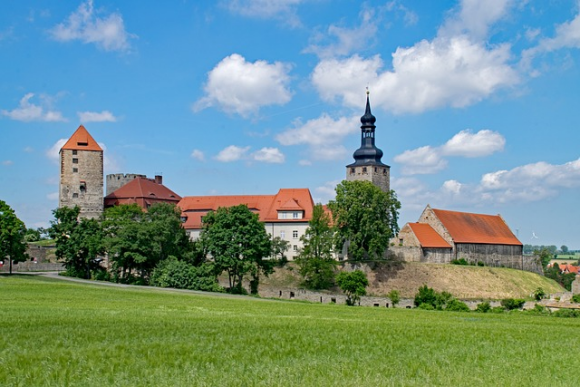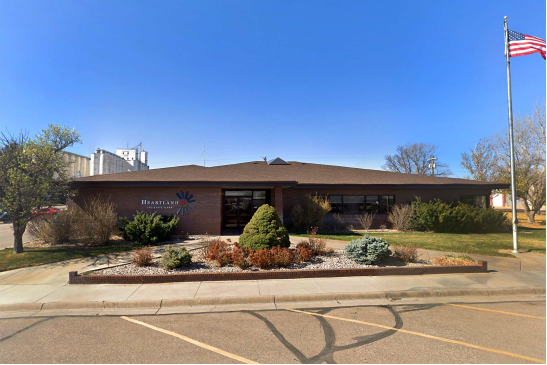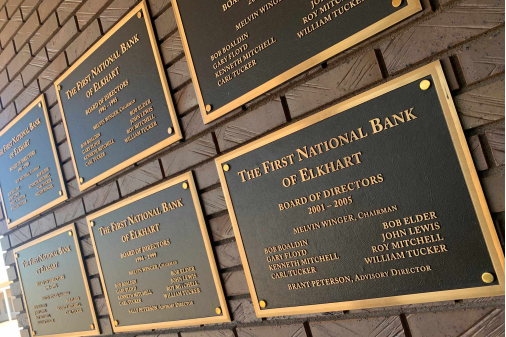
Source/Bloomberg
Compiled by/Ning
At this moment, Shan-Hannes felt very desperate.
On the morning of July 5th, Hannes, the head of a small bank in Elkhart, Kansas, was meeting with his wealthiest depositor in his office. It was at this moment that he made a somewhat strange request.
The CEO of Heartland Tri-State Bank asked the client if he would be willing to lend him $12 million, as he wanted to cash out this money from a cryptocurrency investment. For this transaction, Hannes promised to repay the money in 10 days and provide $1 million in high interest as a return to the client.
Hannes explained that he had already wired money to an entity in Hong Kong for investing in cryptocurrency, but there was a problem with the transfer, so he currently needed more funds, with a portion of the money already transferred to the entity in Hong Kong.
The client, a local farmer, inquired whether this money was the bank's own funds, to which he was assured that it was not bank funds, but personal funds. However, he still felt suspicious, even though he had no reason not to trust his friend: 52-year-old Hannes was a respected figure in Elkhart, a town of about 1,800 people in southwest Kansas. Not only was he a member of the school board and occasionally preached at the local church, and sometimes mowed his neighbors' lawns on weekends, but last year, he was also elected as the head of the Kansas Bankers Association.
Nevertheless, the client, who did not want to reveal his name, still refused this seemingly tempting loan, as the nationwide bank closures were under scrutiny at the time, so he did not trust the transaction very much. He told Hannes that the investment seemed like a cryptocurrency scam. The farmer told Hannes that if he wanted to get his money back, he should immediately go to Hong Kong to retrieve it.
About a week later, after learning from a bank employee that Hannes had already wired out $12 million, the client immediately found a member of the Heartland board and informed the board member of his meeting with Hannes, inquiring about the possibility of liquidation risk at the bank. The bank representative then contacted the regulatory agency, and on July 28, the Kansas Bank Commissioner's Office announced the bankruptcy of Heartland and its official closure.

Exterior of Heartland Bank, Source: Bloomberg
The Federal Deposit Insurance Corporation (FDIC), designated as the receiver for the bank, stated in a statement that it is expected to pay out $54 million from its insurance fund to ensure the interests of depositors, with the maximum payout to individual depositors reaching $500,000. This indirectly confirms the seriousness of the situation—Heartland Bank's total assets were only $139 million, and now the institution has to allocate nearly half of its assets for compensation, indicating that the actual shortfall amount is not insignificant. A few days later, State Bank Commissioner David Herndon told the Financial Times that Heartland's bankruptcy was due to a cryptocurrency scam; Herndon said in an email that the institution's intervention had ended after the FDIC was designated as the receiver.
The Federal Deposit Insurance Corporation (FDIC) declined to comment, stating that the company is reviewing all bankrupt banks in the United States. Hannes was not accused of any wrongdoing, but he did not answer detailed questions. This report is based on interviews with three people familiar with the events leading to the bank's closure, all of whom declined to be named due to the sensitivity of the matter.
Elkhart is a small town that can be reached by driving two hours along Highway 56 from Dodge City. It is located in the southwest corner of Kansas, at the junction of Kansas with Colorado and Oklahoma. In the city center, there is a statue of a deer welcoming visitors, symbolizing the resilience and unity of the residents.
In the words of a local resident, this tightly knit community can raise $10,000 for those in need just by selling chicken and noodles. As one of the only two banks in town, Heartland plays an important role in the community—from sponsoring the annual county fair banquet to providing a "Friendship Fund" for those in need of medical expenses. Hannes's bank specifically provides loans to agricultural producers and is the backbone of the community. But now, the building where the bank was located has a new sign: Dream First Bank, the institution that acquired Heartland Bank's assets at the end of July.
Elkhart is a small town where strangers wave at you as they drive by, but they are also curious about who you are and what you do. In other words, gossip still spreads quickly in the small town. After the bank closed, vehicles from other states surrounded the bank, and discussions were ongoing. In recent weeks, FBI agents have brought community leaders associated with the bank to the local courthouse for questioning. The residents of Elkhart are very familiar with each other, and they can tell who is being questioned based on the cars parked outside. (An FBI spokesperson stated that the agency cannot confirm or deny the existence of an investigation).
Hannes began his banking career in 1993 at Elkhart's First National Bank (the predecessor of Heartland). According to his later testimony to the Kansas State Legislature, he led the acquisition of the bank in 2011 and kept it locally owned. Hannes seized every opportunity to travel from Elkhart to Washington, D.C., where he testified multiple times to Congress about the importance of community banks. As chairman of the Kansas Bankers Association, he had face-to-face meetings with Rohit Chopra, the director of the Consumer Financial Protection Bureau. Kansas Republican Senator Roger Marshall described Hannes as "Elkhart's pride" in 2019:
Hannes testified today before the House Agriculture Committee's Commodity Exchanges, Energy, and Credit Subcommittee, articulating rural agricultural credit issues from the perspective of the banking industry. Well done!
https://t.co/kFazSelLZB pic.twitter.com/vviJvFU9i5
- Kansas Bankers Association (@KansasBankers) December 11, 2019
Most people in Elkhart were not affected by the bank closure, as their accounts were simply transferred to "Dream First Bank." However, shareholders could potentially lose all their investments. The bank's stock is owned by Elkhart Financial Corporation, which is not within the scope of the FDIC's receivership. According to a 2021 document from the Federal Reserve, Hannes and his family members were among the largest shareholders of the bank; at that time, Hannes held about 7% of the shares.
Other shareholders include families owning local businesses, teachers, retirees, and farmers. One shareholder who did not want to be named said she did not believe Hannes had any ill intentions. She added that in the current situation, there would be no reward or feedback even if she felt angry about the losses. However, many non-shareholding farmers are disappointed in Hannes and feel that those facing the prospect of losing their retirement assets have been unfairly affected, so he has the right to be concerned after the meeting. Two people familiar with the situation said that it was actually the bank's money that got caught up in this cryptocurrency scam.

Heartland Bank was formerly known as Elkhart First National Bank. Its office displayed plaques of former directors, Source: Bloomberg
However, the specific details of the scam are still unclear. State banking commissioner Herndon sent a link to Bloomberg News via email, and the link contained a warning issued by the U.S. Department of the Treasury's Financial Crimes Enforcement Network (FinCEN) in September, which is dedicated to protecting the financial system and warning against so-called "pig slaughter" activities.
The pattern has nothing to do with domestic pig slaughter, but rather it occurs in the field of cryptocurrency investment. Scammers use dating apps and social media websites to find victims, creating a fake profile to contact potential victims through social media, WhatsApp, Tinder, or other dating websites, or even random text messages, pretending to be an incorrect number or an old acquaintance. Their goal is to engage in friendly discussions with the victims, attempting to become their "new friend" or "lover."
Once they have established a certain level of trust, they slowly persuade the victims to invest in cryptocurrency, recommending a seemingly genuine but fake website or application controlled by the scammers. Initially, victims make small investments, and the scammers ensure moderate returns on the investments, even providing withdrawal operations to prove the compliance of the app. Once the funds reach a certain amount, the scammers abscond with all the money and disappear, and the anonymity of the virtual currency account makes it difficult to trace.
In this way, victims are lured into providing more and more money—just like fattening pigs for slaughter. According to law enforcement data cited by the Treasury Department, it is estimated that in the United States alone, victims of similar methods and other cryptocurrency investment fraud have lost billions of dollars. Hannes is highly likely to have fallen victim to this.
Hannes understands the role he and his bank played in Elkhart. "Think about what it would mean for many rural communities if there weren't local banks," he told Kansas legislators in 2021. "How many high school scoreboards, county fair donations, band sponsorships, school kids' water bottles, scholarship donors, community organization members, Santa Day sponsors, and parade floats would disappear without the support of local community banks and their employees?"
Dream First Bank is not entirely a local company. The company is headquartered in Syracuse, Kansas, 72 miles away, and it stated that employees' jobs will not be affected by this change. Following the collapse of regional lending companies such as Silicon Valley Bank and Silvergate earlier this year, Heartland, this small bank, also collapsed.
As for Hannes, he is now unemployed. He has resigned from the school board and no longer holds a position in the Kansas Bankers Association. Residents of Elkhart say they have seen him in town a few times. But according to residents, he spends most of his time at home due to the ongoing investigation. His ranch-style new house—American-style, with a basketball hoop and a large backyard—is just a short drive from the courthouse where the FBI office is located.
免责声明:本文章仅代表作者个人观点,不代表本平台的立场和观点。本文章仅供信息分享,不构成对任何人的任何投资建议。用户与作者之间的任何争议,与本平台无关。如网页中刊载的文章或图片涉及侵权,请提供相关的权利证明和身份证明发送邮件到support@aicoin.com,本平台相关工作人员将会进行核查。




